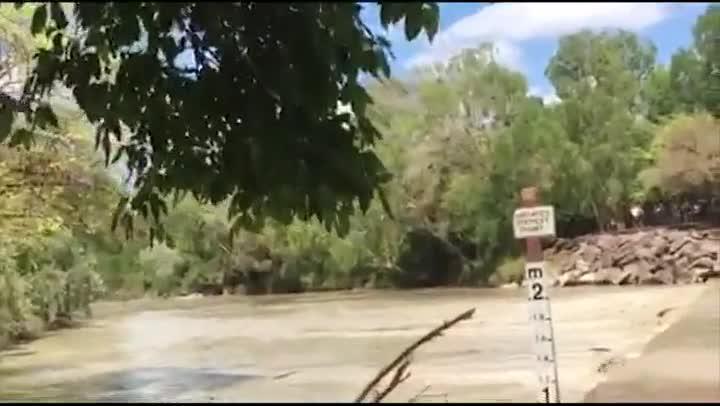Woman locks eyes with crocodile at Cahills Crossing
A WEEKEND at Cahills Crossing could well have ended in tragedy for a foolhardy woman who tried to attract the attention of a close to 4m saltie before throwing a stick at the animal
Northern Territory
Don't miss out on the headlines from Northern Territory. Followed categories will be added to My News.
A WEEKEND at Cahills Crossing – a famous feeding ground for crocodiles – could well have ended in tragedy for a foolhardy woman who tried to attract the attention of a close to 4m saltie, standing just steps from the water’s edge.
The woman, who appeared unsteady on her feet, stood within striking distance of the croc, seemingly oblivious to her deadly predicament.
Even her inquisitive puppy – named Meatball – appeared more Crocwise, taking shelter behind the woman as she tried to scare the croc away by waving her thong at it. Meatball, like all other dogs, is banned from Kakadu, a Parks Australia spokesman said.
After the woman put her double plugger back on, she leant down towards the water to pick up a small stick, which she then threw at the already agitated animal.
At least eight more crocs could be seen lurking in the water nearby.

Territory Wildlife croc catcher Tommy Nichols said although Kakadu was not in his area of responsibility, it was known both for the number of crocs and for idiotic human behaviour.
“It’s known as a place where people go just to see crocodiles ... people do a lot of crazy things,” he said.
“Unfortunately it’s not uncommon, I’m honestly surprised people aren’t taken there.
“It’s just human behaviour.”
The crossing, on the East Alligator River, is regularly the scene of misadventure, with dozens of cars and four-wheel- drives washed off the crossing into the fast-moving water each year.
The last death at the crossing was in 1987, when 40-year-old Kerry McLoughlin was decapitated by a monster saltie.
Crocs are known to at times gather at the crossing in a bid to grab a feed as fish move upstream with the big tides.
Salties often make their way up on to the crossing to warm themselves in the sun, and remain almost impossible to spot until they surface.




